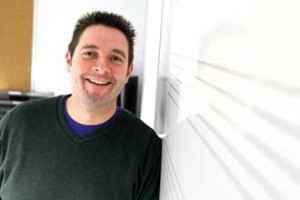
Schulich prof in running for five Grammies
By Chris Chipello
Recording engineer and Schulich School of Music professor Richard King has collected seven Grammy awards over the years, but he’s never been in the running for as many honours as he is this time around.
Albums engineered by King have been nominated in five categories – from Best Classical (Bernstein: Mass) to Best Tropical Latin (Bach in Havana, by Tiempo Libre, a Miami-based band of Cuban musicians). Winners will be announced at the Jan. 31 Grammy Awards event in Los Angeles.
“This is absolutely a first for me. Almost everything I worked on in the past year got a hit, in some category or another,” King said. That includes two entries for Best Classical Crossover Album, Yo-Yo Ma & Friends: Songs of Joy and Peace and The Melody of Rhythm. Sounding Point, by young guitarist Julian Lage, is up for Best Contemporary Jazz Album. And Verismo Arias, by soprano Renée Fleming, is a candidate for Best Classical Vocal Performance.
After completing a Master’s in Sound Recording at McGill in 1991, King did film-sound work around Montreal before joining Sony Music Studios in New York in 1992. He stayed with Sony until 2007, then went on to run a freelance business that was keeping him “incredibly busy,” with little time to spend at home. “We just had a little baby, so I want to try to have a more reasonable schedule. It’s just nice to be home more often, especially on the weekends. But it was always part of my grand plan to teach one day, and to hopefully come back to McGill and do it here.”
“It’s a great time to be involved” with Schulich. “Things aren’t quite finished” in the new music building’s cavernous basement studio facility, “so I have a hand in helping get everything completed,” he said. “We’ve just purchased a large format mixing console for the big room.” Ultimately, “we’d like to do a little bit of professional film-scoring work in that room – because it’s large enough, but also just to show the world that we are a front-line facility with state-of-the art technology and we can do these types of jobs — and that reflects the training our students are getting.”
Among his professors was Wieslaw Woszczyk, founding director of the Centre for Interdisciplinary Research in Music Media and Technology. “Now we’re colleagues,” King said. “I love working with him, and it’s really exciting to be back here.”
King now juggles teaching in Montreal with recording projects in New York. “I’m trying to be here more than there,” he said. “My wife’s family is from the Montreal area, so it’s also nice to be back near family.”
Growing up in Nova Scotia, King played percussion in youth orchestras and guitar in a punk band – “both ends of the spectrum.” When he graduated from Dalhousie with a Bachelor’s degree in music, “I thought that I didn’t really have the goods to win a top (percussion) job in an orchestra in Canada.” But he had done some sound work for live performances as a side gig while he was a student. So when a cousin who studied at McGill told him about the Masters program in Sound Recording program here, he decided to give it a try. “I thought I’d dip my toe in” and try it for a year, “and ended up loving it.”
The McGill Sound Recording program, he notes, is similar in style to the European “Tonmeister” program: applicants must have a Bachelor’s of Music, so the program layers technical training on top of their solid musical background – just the sort of profile that Sony was looking for at the time.
Great recording engineers must have other qualities, as well. “Patience and diplomacy are right at the top of the list. Obviously a solid technical background and strong musical ear are paramount. But 50 per cent of my success, I would say, is based on my ability to read what the clients want – whether it’s the producer I’m working with, or the artist – and being able to translate the way they explain their impression of the sound, from musical terms into technical terms. If they’re using words like ‘muddy’ or ‘wooly’ or ‘chesty’ I have to figure out: ‘Does that mean they hear too much in the 300-hertz area?’ I have to sort of translate in order to fix what’s wrong.’
“And patience, certainly. If it’s 3:00 in the morning, and you feel like everything is covered well but the artist wants to do two or three more run-throughs of a piece, you have to just say, ‘Sure.’ Sometimes they come up with something magical late at night, and other times you have to sort of wait for them to realize that they peaked out earlier, without insulting them.”
Come Jan. 31, King will be rooting for Tiempo Libre and his other artists to have their names called. While he is personally nominated as engineer for the Best Classical Album award, in other categories he and the producer would get so-called “gratis Grammy” awards if their artist wins. “We call them guilty-by- association awards.”
